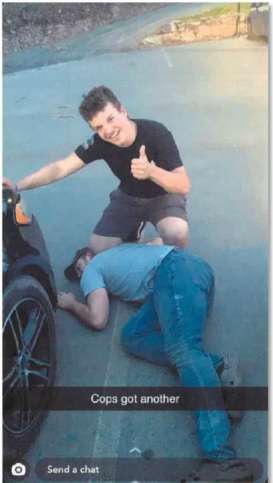The Second Circuit will be hearing the appeal of the district court decision in Leroy v. Livingston Manor School Dist.; here’s the summary of the facts from Leroy’s opening brief (the image involved is included above):
On April 19, 2021, while still a Livingston Manor student, Leroy was socializing with three friends after school hours, away from school property. The four were in a dance studio parking lot to pick up Leroy’s friend’s sister. While there, one friend told Leroy that there had been a noise coming from his car on the drive over and Leroy laid on the ground in front of the car to investigate. While he was there, another friend knelt on Leroy’s back and had the third friend take a picture.
The three friends each posted the picture to their personal Snapchat accounts, with Leroy adding the caption, “Cops got another.”
Another posted the same image but with a “Black Lives Matter” logo overlayed. Upon receiving several disapproving private messages on the Snapchat platform, Leroy deleted his post and asked the others to do the same, which they did. All told, the images were accessible to others for around seven minutes….
Within the seven minutes that the posts were available, a fellow Livingston Manor student, Leroy’s former girlfriend, “Grace” …, captured a screenshot Leroy’s post, and reposted it on Facebook and other online platforms to “condemn” Leroy. Apparently to amplify any public response, Grace also jointly posted another, out-of-context photo of two other Livingston Manor students taken by Leroy in March of 2021. An activist, Gem Amber Sun Helper reposted the images with commentary asserting that Livingston Manor “surpassed its dark history of being a Sundown Town with its own KKK Chapter.” Helper or a later commentator shared this post and the phone number for Livingston Manor Central school, telling viewers to “dm” direct or private message her for additional contact information.
Grace and Helper’s tactics had the apparently-intended effect against Leroy. Several individuals emailed their disapproval to John Evans, Livingston Manor’s Superintendent, who responded with brief remarks about an ongoing investigation and disavowing racism in the school. The school’s principal, Shirlee Davis, and its guidance counselor, Meagan Edwards, also received similar emails. Other school administrators also received emails …. The record discloses a total of 23 email exchanges between community members and school district employees.
The following morning, Davis instructed Leroy not to attend school but to instead attend a meeting with his parents before her and Evans. During the meeting, Davis and Evans interviewed Leroy about the incident. On April 21, Davis sent a letter to Leroy’s parents informing them that she was suspending Leroy for five days, the maximum permissible under state law without a hearing, for “post[ing] racially offensive material on social media…” and referring the matter to Evans to determine whether such a hearing and additional punishment was warranted.
Based on a “buzz up the building” and rumors of a student protest in response to the Snapchat posts, Evans scheduled a brief assembly for seventh through twelfth grades “kind of as a counter measure to that.” At the assembly, Evans preached to the students that racism had no place in their school. The entire assembly took about 15 to 20 minutes. A few students stayed afterward for “a few minutes” for a supervised kneeling protest.
The same day, Evans contacted Capital Region Board District Superintendent Anita Murphy to arrange a formal investigation and report on the incident. The investigator, Bethany Centrone, Legal Counsel for Capital Region Board, spoke with Leroy’s father, Evans, and two additional students. She relied on a review of the interviews conducted by Davis and Evans and other materials to produce her report.
In her report, Centrone found that regardless of Leroy’s intent, his “post[] [was] targeted at African Americans and [was] discriminatory.” She recommended that Leroy and the others involved “be referred to a Superintendent’s Hearing to determine whether additional discipline…is warranted for any or all of these students.” …
After a disciplinary hearing, Evans exceed[ed] the hearing officer’s recommendation and ban[ned] Leroy from school and extracurricular activities, including his graduation ceremony [though a New York state court enjoined the ban from the graduation ceremony].
The Hamilton Lincoln Law Institute, which is representing Leroy, has posted its brief and the amicus briefs on its site; they include briefs from the ACLU (national); FIRE, the Manhattan Institute, and the National Coalition Against Censorship; several First Amendment Scholars; the Liberty Justice Center; and the Center for Individual Rights and me.
The post Briefs Supporting Strong First Amendment Protection for K-12 Students’ Outside-School Speech appeared first on Reason.com.







